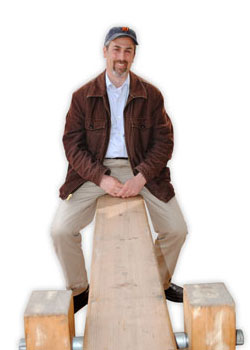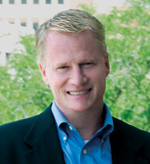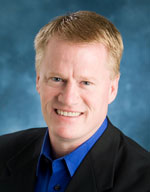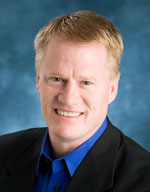[Editor's Note: HD, a.k.a. Dave Askins, editor of The Ann Arbor Chronicle, is also publisher of an online series of interviews on a teeter totter. Introductions to new Teeter Talks, like this one, also appear on The Chronicle's website.]

Dante Chinni, co-athor of "Our Patchwork Nation." That's a Tigers cap he's wearing, and it's not accidental.
“I don’t want to be another city. I resent the fact that we are compared to other cities when projects are being proposed.”
That was Ali Ramlawi, owner of the Jerusalem Garden on South Fifth Avenue in downtown Ann Arbor, addressing the April 4, 2011 meeting of the Ann Arbor city council. He was criticizing the Ann Arbor Downtown Development Authority, and advocating against a proposed conference center and hotel project on the Library Lot – the council voted the project down later that evening.
“Ann Arbor will change … but it won’t become Detroit.”
That was Dante Chinni, while riding the the teeter totter on my front porch last Thursday afternoon. Chinni has made it part of his job to compare communities like Ann Arbor – Washtenaw County, actually – to other places in the country.
Who is Dante Chinni? And why should Ann Arbor care what he thinks?
On his website, Chinni describes himself as a “a card-carrying member of the East Coast Media Industrial Complex.” The part of his job that lets him compare one place to another – in a statistically sophisticated way – is a project Chinni conceived called Patchwork Nation. It’s funded by the Knight Foundation. The effort has already produced a book, which he co-authored with James Gimpel: “Our Patchwork Nation: The Surprising Truth about the ‘Real’ America.”
Washtenaw County is featured in the chapter that introduces readers to the concept of a “Campus and Careers” community type. The classification, as well as a read through Dante’s Talk, confirm that mostly what defines Ann Arbor – at least for people on the outside looking in – is its place as the home of the University of Michigan. And certainly for people on the inside, it’s difficult to argue that UM isn’t currently the single most important institution in the community.
But some insiders – and by this I mean not just people who live, work and play here, but actual Ann Arbor insiders – are starting to float the question of what else Ann Arbor might aspire to be besides home to “the most profound educational institution in the Midwest.” [Full Story]









